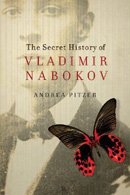The Daily Beast and The New Criterion on The Secret History
Long after I expected the well of reviews for The Secret History to have run dry, two new appraisals popped up. Earlier this month, Jeffrey Meyers weighed in on the book for The New Criterion. In “Legacy of Sorrows,” Meyers—a biographer of Edmund Wilson and many other literary figures—declares that The magician buried his past […]
Terror’s ghosts: Nabokov’s Pale Fire and the return from the Gulag
Heroes returning home in disguise have been around since the days of Homer. For just as long, these heroes have been recognized despite their masks. Coming back from the Trojan War dressed as a beggar, Odysseus found that his dog and childhood nurse could see through his deception. But what about events that transform survivors […]
Beautiful failures: Nabokov, Stalin, and the death of Hamlet
Stuck in the shadows of more accomplished, more loved siblings, lesser novels are often the bitter children of genius. They surrender family secrets and the details of their creators’ flawed parenting. Their failures provide their own intrigue. Such is the case with Bend Sinister, Vladimir Nabokov’s first novel written after his 1940 arrival in America. Revealing more authorial […]
Nabokov, Feynman, and the names of trees
What do Richard Feynman, theoretical physicist, and Vladimir Nabokov, author of Lolita, have in common? For one, synesthesia—a blending of sensory input experienced by four percent of the population. Letters for Nabokov came paired with specific colors, and Feynman similarly reported seeing “light tan j’s, slightly violet-bluish n’s, and dark brown x’s flying around” in […]
The New York Review of Books looks at The Secret History
Nabokov had a complicated relationship with his critics, not least Edmund Wilson, whose 1965 review of Eugene Onegin in The New York Review of Books put a stake through the heart of their friendship. Here’s Wilson’s opening line: This production, though in certain ways valuable, is something of a disappointment; and the reviewer, though a […]
The mysteries of Zembla
So much fiction relies on what’s missing from a story, the details an author fails to or chooses not to include. In the spirit of just such incomplete information, Vladimir Nabokov’s 1962 novel Pale Fire delivers that most unreliable of narrators, the mad Charles Kinbote, who obsesses over ping-pong, young boys, and his beloved country […]
